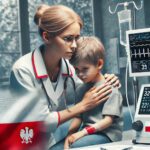📊 A study reveals the worsening psychosocial situation of families caring for children with rare diseases during the COVID-19 pandemic.
Why it matters: This article highlights the urgent need to improve psychosocial support for these families, showing an increase in stress and a decline in quality of life during the pandemic.
🧠 What’s happening:
The pandemic has exacerbated existing issues, such as late diagnoses and limited access to specialists and treatments.
Family members face high levels of stress, needing more information on psychosocial support and socio-legal advice.
🔍 Between the Lines:
Nearly 90% of caregivers reported clinical stress, indicating a deep mental health crisis.
The demand for psychosocial information is high, but few are aware of useful web pages, suggesting a significant gap in available resources.
🏃 In summary:
The research underscores the importance of family-centered care to alleviate stress on caregivers and improve the well-being of children.
🖼️ The bigger picture: The psychosocial situation of families with children who have rare diseases was severely impacted by the pandemic, highlighting the need for concrete actions to provide adequate support and psychosocial information during and after the health crisis.
💭 Our take: Paying attention to the mental health of these families is crucial to addressing not only the pandemic but also the ongoing challenges posed by rare diseases.
The article in a Q&A format
- What were the main findings regarding the psychosocial situation of families caring for children with rare diseases during the COVID-19 pandemic?
The main findings regarding the psychosocial situation of families caring for children with rare diseases during the COVID-19 pandemic are as follows:
- Elevated caregiver distress: The study highlighted that family caregivers of children with rare diseases experienced high levels of distress during the early stages of the COVID-19 pandemic.
- Unmet psychosocial information needs: Caregivers reported extensive needs for psychosocial information, including navigating the health system, coping with emotional strain, and support options for daily living.
- Impaired health-related quality of life (HRQoL): The research indicated that children with rare diseases had impaired HRQoL during the pandemic, further emphasizing the challenges faced by these families.
- Increased psychosocial information needs: Due to restrictions during the pandemic, the psychosocial information needs of families caring for children with rare diseases likely increased, highlighting the importance of additional support services.
- Impact of COVID-19 restrictions: Pandemic-specific stressors, such as school closures, limited access to social support, and restricted visitation policies, added to the existing challenges faced by families of children with rare diseases.
- How did researchers conduct the online cross-sectional survey to collect data for this study?
The researchers conducted an online cross-sectional survey to gather data for the study on the psychosocial situation of families caring for children with rare diseases during the COVID-19 pandemic. Here is an overview of how the survey was conducted:
- Study Design: The survey was part of the German CARE-FAM-NET project and was carried out between March and August 2020, covering the initial stages of the COVID-19 pandemic in Germany.
- Ethical Approval: Ethical approval for the study was obtained from the Ethics Committee of the Hamburg Medical Association, ensuring compliance with ethical standards.
- Participant Recruitment: The study sample included family caregivers, mostly mothers, of children with rare diseases. Participants were recruited to take part in the online survey.
- Survey Administration: The survey was administered online using LimeSurvey, a platform for conducting online surveys. Participants accessed the survey and provided informed consent to participate.
- Survey Content: The survey included validated instruments and self-developed items to assess demographic and disease-related characteristics, caregiver distress levels, psychosocial information needs, and the health-related quality of life of children with rare diseases.
- Data Collection: Participants completed the online survey, with adaptive questions to tailor the survey based on previous responses and ensure relevant data collection.
- Data Analysis: Descriptive statistics and correlation analysis were used to analyze the psychosocial situation of the families during the COVID-19 pandemic and explore the interrelations among the variables.
Globally, researchers used an online survey approach to collect data on the psychosocial challenges faced by families caring for children with rare diseases during the COVID-19 pandemic, providing valuable insights into their experiences and needs.
- What implications do the findings of this study have for healthcare providers and policymakers in supporting families of children with rare diseases during crises like the COVID-19 pandemic?
The findings from the study on the psychosocial situation of families caring for children with rare diseases during the COVID-19 pandemic have significant implications for healthcare providers and managers in supporting these families during times of crisis. Here are some key implications:
- Increased Psychosocial Support: Healthcare providers and managers need to recognize the high levels of distress and psychosocial information needs among caregivers of children with rare diseases. There is a critical need to increase psychosocial support services tailored to the specific needs of these families.
- Comprehensive Care Programs: The study underscores the importance of comprehensive care programs that address not only the medical needs of children with rare diseases but also the psychosocial well-being of their caregivers. Healthcare providers should integrate psychosocial support services into routine care for families facing rare diseases.
- Awareness and Action: The results highlight the unmet psychosocial care needs of family caregivers of children with rare diseases. Healthcare providers and managers should be aware of the challenges faced by these families and take steps to ensure the availability of sufficient psychosocial care and support services.
- Accessible Support Services: Managers should ensure that psychosocial support services are accessible to all families caring for children with rare diseases, especially in times of crisis, such as the COVID-19 pandemic. Low-cost offerings that can be easily integrated into daily life to support these families should be made available.
- Model Programs: Initiatives like the CARE-FAM-NET project, which aims to improve access to psychosocial services for families of children with rare diseases, can serve as a model for other countries. Managers can learn from successful programs and implement similar initiatives to support families in crisis situations.
By addressing the psychosocial needs of families caring for children with rare diseases, healthcare providers and managers can improve the well-being of both caregivers and children, ultimately enhancing the overall quality of care and support for these vulnerable populations during times of crisis.
Source: Rihm, L., Glaus, J., Grolimund, J., Jenewein, J., Nuoffer, J.-M., Tinner, E. M., & Germeni, E. (2022). The psychosocial situation of families caring for children with rare diseases during the COVID-19 pandemic: results of a cross-sectional online survey. Orphanet Journal of Rare Diseases, 17(1), 1-13. Available in https://doi.org/10.1186/s13023-022-02595-0
Este post também está disponível em: Português (Portuguese (Brazil))






